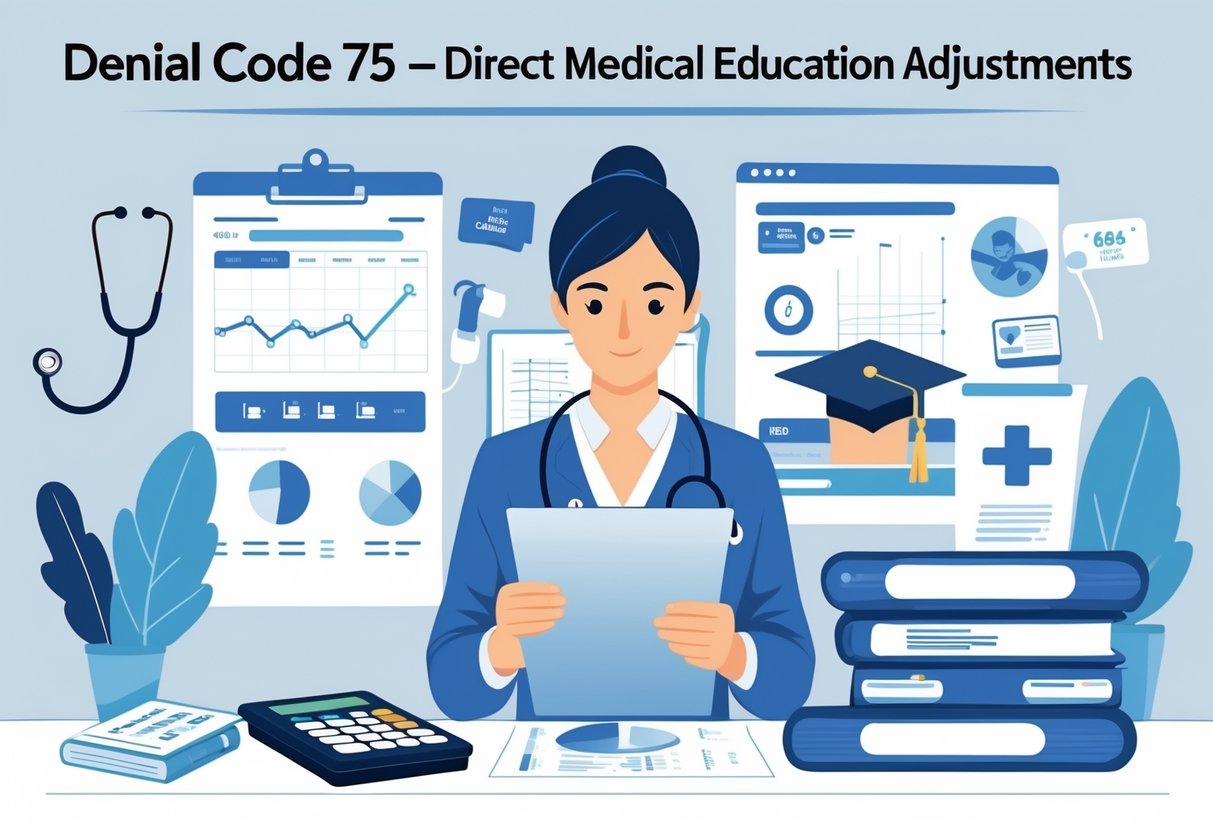Denial code 75, labeled as Direct Medical Education Adjustment, occurs when claims are adjusted due to differences in medical education expenses. This denial means the payment was reduced to reflect costs linked to training medical staff, not the actual medical services you provided.
Understanding why this happens helps you manage billing expectations and avoid confusion during reimbursement. The adjustment is part of how payment systems handle education-related costs separately from regular patient care charges.
If you deal with medical billing, knowing the meaning of denial code 75 can save time and improve your claim handling. It shows that some payment changes are not errors but planned adjustments tied to specific rules.
Understanding Denial Code 75 – Direct Medical Education Adjustment

Denial Code 75 relates specifically to payments affected by Direct Medical Education (DME) costs. It is important to understand why claims might be denied under this code, what rules apply, and how payers set their guidelines for adjustments.
Definition and Purpose
Denial Code 75 means your claim was denied because of an adjustment tied to Direct Medical Education expenses. These are costs hospitals incur for teaching medical students, residents, and interns.
The purpose is to separate regular medical service payments from funds allocated to teaching activities. This adjustment ensures that payments reflect the hospital’s education-related costs properly. It prevents duplicate payments for the same educational expenses.
Understanding this code helps you avoid confusion about why a claim was reduced or denied and guides you in handling related billing correctly.
Key Criteria for Application
Denial Code 75 is applied when the submitted charges include amounts already accounted for in the hospital’s Direct Medical Education payment.
The main criteria include:
- Services performed in teaching hospitals
- Charges overlapping with federally recognized DME costs
- Claims submitted without proper separation of education and treatment fees
You should verify that charges comply with regulations about DME cost reporting. Incorrect splitting of costs or failure to document education expenses properly often trigger this denial.
Official Payer Guidelines
Payers, especially Medicare, have strict rules for applying Denial Code 75 related to the DME adjustment.
Key points:
- Medicare requires hospitals to submit cost reports to identify allowable DME expenses.
- Payment adjustments are made after comparing submitted claims with these reports.
- Claims that duplicate DME costs in billed services face denial under Code 75.
Payers may also require documentation showing that education costs were not billed directly to avoid denials. You should review payer-specific manuals to comply fully with their instructions on DME adjustments.
Causes of Denial Code 75

Denial Code 75 happens because of specific issues with how claims are billed and documented. These problems can delay payment or trigger adjustments to your Direct Medical Education (DME) payments.
Common Billing Errors
Billing errors are a main cause of Denial Code 75. You might submit claims with incorrect provider numbers or add-on codes that do not match your actual services. Errors in submitting the academic year or the number of residents involved in training can also lead to denials.
Another frequent mistake is not updating billing details when your institution’s status changes. For example, failing to adjust for new residency programs or changes in hospital affiliations often triggers this denial.
Check that all billing information is accurate and matches CMS guidelines for DME payments. Using outdated or incorrect codes can directly cause these denials and slow down your reimbursement.
Documentation Inaccuracies
Poor documentation is another common cause of Denial Code 75. If you don’t clearly document the number of residents trained or the types of educational expenses, claims are likely to be denied.
Your supporting documents should include detailed, verifiable data on direct costs related to medical education. Missing or incomplete records about salary, benefits, or teaching assignments weaken your claim’s validity.
You need to maintain clear, complete, and accurate documentation. This helps prove that your institution meets the requirements for DME adjustments and reduces the chance of denial.
Direct Medical Education Adjustment Requirements
To handle denial code 75, you must meet specific rules about who qualifies, what paperwork you need, and how to report the information properly. These points are essential for avoiding payment problems.
Eligibility Determinants
You need to confirm that the provider participates in approved medical education programs. This includes hospitals that incur direct costs for educating medical residents.
Only providers with Medicare-approved residency programs qualify. You must verify if your institution is listed as teaching or non-teaching under Medicare rules.
The number of full-time equivalent residents and the scope of their training affect your eligibility. Make sure the residents’ activities relate directly to patient care and education.
Supporting Documentation Standards
You must keep clear records proving your direct medical education costs. These include payroll records for resident salaries and benefits.
Supporting documents should also show the number of residents and the time they spend in training. Documentation must be accurate and up to date for audits.
You are required to maintain evidence of contracts or agreements with residents or educational bodies. This confirms the legitimacy of education expenses claimed.
Reporting and Coding Protocols
You must report the direct medical education adjustment using the correct billing codes. Coding errors often cause denial code 75.
Use specific Medicare codes for direct medical education adjustments; do not mix them with indirect or other adjustments.
Report the data exactly as required, including resident counts and cost details. Double-check the entries for accuracy before submission.
Resolving Denial Code 75
To fix this denial, you need to focus on correcting your claim submission and knowing how to appeal if needed. Accurate data entry and clear documentation are key to getting paid.
Correcting Submission Errors
Check the claim for errors related to Direct Medical Education (DME) adjustments. Common mistakes include wrong provider numbers, incorrect cost reports, or missing supporting documents.
Make sure your cost report matches the billing period. Also, verify the provider’s unique identifiers are accurate on the claim form.
If you find mistakes, correct them and resubmit the claim promptly. Use electronic systems when possible to reduce errors. Keep detailed records of what you change.
Appeal Strategies and Best Practices
If you believe your claim was wrongly denied, prepare an appeal with strong evidence. Gather the hospital cost report, billing records, and payer policies related to DME.
Clearly explain why your adjustment qualifies under the rules. Use bullet points to organize your rationale.
Submit the appeal quickly. Track the appeal status, and respond to any requests for more information. Persistence improves your chance of success.
Preventing Direct Medical Education Adjustment Denials
You need to focus on improving your processes and ensuring your staff understands the rules fully. Taking clear steps in these areas helps avoid errors that cause Denial Code 75.
Workflow Improvements
Review your billing and documentation processes regularly. Make sure all information about medical education costs is accurate and up to date before submitting claims.
Use checklists to verify that your data aligns with CMS guidelines for Direct Medical Education (DME). Errors often occur when cost reports are incomplete or outdated.
Implement automated alerts or software that flags missing or inconsistent information. This helps catch errors early, reducing the chances of denial.
Track denial patterns to identify which steps in your workflow need change. Improving your review steps before claims submission saves time and prevents repeated denials.
Staff Training and Education
Train your staff on the specific requirements of Direct Medical Education claims. Make sure they understand which costs are allowed and how to document them properly.
Hold regular sessions to update your team on any changes in CMS rules or billing codes related to DME. Staying current prevents mistakes.
Use real denials as case studies for training. Showing examples of Denial Code 75 helps your team recognize common errors and learn how to avoid them.
Encourage open communication so staff feel comfortable asking questions about claim submissions. Clear understanding reduces the risk of denials linked to misinformation.
Frequently Asked Questions
Denial Code 75 usually relates to adjustments in payments tied to Direct Medical Education (DME). It can affect how much you get reimbursed and often requires specific documentation or corrections to your claim.
What does Denial Code 75 indicate on a hospital claim?
Denial Code 75 means the claim payment was adjusted because the hospital’s Direct Medical Education costs need review. It signals that part of the payment for teaching-related expenses was reduced or changed.
How can providers address and correct a Denial Code 75?
You need to review your DME-related charges and ensure all documentation accurately supports those costs. Correct any errors on the claim and resubmit it following the payer’s specific instructions.
Are there specific documentation requirements for Direct Medical Education adjustments?
Yes. You must provide detailed records of intern and resident counts, salaries, and teaching activities. Supporting documents must match the amounts claimed for DME.
What are common reasons for receiving Denial Code 75 on a claim?
Common reasons include mismatched documentation, errors in resident numbers, or claiming unsupported educational costs. Mistakes in payroll data for teaching staff can also cause this denial.
How does Denial Code 75 affect reimbursement for teaching hospitals?
It lowers the payment amount tied to educational activities. This adjustment reduces the funds hospitals receive for training medical staff.
Can Denial Code 75 be appealed, and what is the process for doing so?
Yes, you can appeal it. Submit a formal appeal with corrected documentation and a clear explanation. Follow your payer’s appeal guidelines and deadlines closely.







